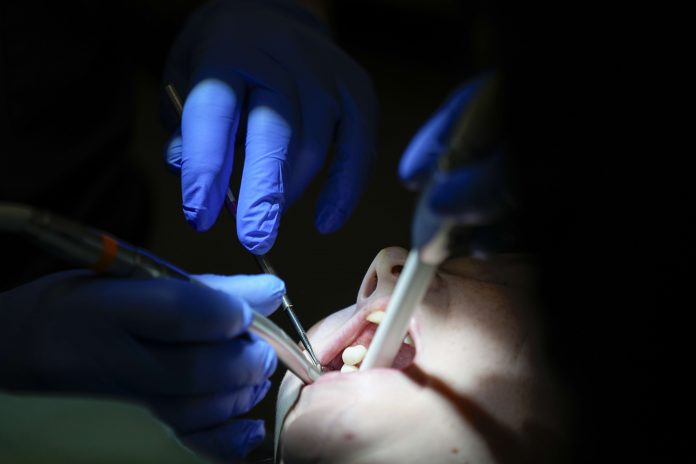
By Michael Casey
Associated Press
NASHVILLE, Tenn. (AP) — For months, Carlton Clemons endured crippling pain from a rotting wisdom tooth. He couldn’t sleep, barely ate and relied on painkillers to get by.
The 67-year-old from Nashville, Tennessee, could not afford to see a dentist on the $1,300-a-month his family gets in Social Security and disability payments. So he waited for the state to roll out a program this year that offers dental care to the more than 650,000 Medicaid recipients like him who are 21 and older. Tennessee is spending about $75 million annually on the program.
“Man, I thought I had made it to heaven because the pain was over,” he said after the tooth was pulled in July at the Meharry Medical College School of Dentistry. “When they did pull it out, I was so happy. I was so glad. Everything just changed after that.”
His wife, Cindy, who also is on Medicaid, has had her teeth pulled at the clinic.
Medicaid, the federal and state health insurance program for the poor, requires states to provide dental coverage for children but not adults. But with a growing recognition of the economic and health costs of poor dental health and an influx of federal pandemic dollars, six states began or expanded their Medicaid programs this year to provide coverage for adults.
Access remains difficult in many of those states with some dentists refusing to treat Medicaid patients. Even those who want to expand their practice are finding themselves caught up in red tape.
Dr. Victor Wu, the chief medical officer for Tennessee’s Medicaid program, said he was pleased with the rollout of Medicaid dental benefits that started in January, but he acknowledges the state needs to build out its network and increase the participation rate among dentists.
While dental care often is seen as routine, the poor often go without any care for years or even decades. Doing so has significant costs, both to taxpayers and to those who cannot afford treatment.
One study from Texas A&M University found that treatment for preventable dental conditions represents up to 2.5% of emergency room visits, at a cost of $2 billion a year. An additional $45 billion is lost year in productivity in the United States annually from untreated oral disease, according to the federal Centers for Disease Control and Prevention.
“You put off care and you get sicker and then it becomes a crisis where you’re missing work or you end up going to the emergency department where you get a big bill and you don’t get the tooth actually taken care of,” said Dr. Rhonda Switzer-Nadasdi, the chief executive officer of Interfaith Dental Clinic which has offices in Nashville and Murfreesboro, Tennessee.
“You need good teeth to have good employment,” Switzer-Nadasdi said.
All states provide some Medicaid dental benefits for adults, but some limit it to only specific segments of the population, like pregnant women or those who have intellectual disabilities, or cover only emergency care, according to CareQuest Institute for Oral Health, a nonprofit that advocates for expanded dental care.
Hawaii, Tennessee, Kentucky, Michigan, Maryland and New Hampshire were the latest to begin or expand their dental coverage; they did so this year.
In New Hampshire, the state is spending $33.4 million over 12 months to provide dental care to its 88,000 Medicaid recipients.
“There is an increasing understanding that oral health is inseparable from health care,” said New Hampshire Democratic Rep. Joe Schapiro, who was the prime sponsor of the expanded dental benefits bill. “The amount of money spent on other health care problems that are related to oral health and the amount of money spent on emergency care when people can’t get any kind of preventive or restorative care is not only unfortunate for those people’s health but cost a tremendous amount of money.”
In Kentucky, Democratic Gov. Andy Beshear pressed ahead with emergency regulations ensuring that about 900,000 Kentuckians would continue having access to dental care after the Republican-led legislature rejected his proposal.
“We are focused on removing roadblocks that prevent people from getting back into the workforce, and this program does just that,” he said.
Virginia expanded its Medicaid program in 2021, budgeting $282 million for the 2022 and 2023 fiscal years to cover dental procedures for more than a million recipients. Last year, Kansas gave dental access to nearly 137,000 Medicaid recipients at a cost of $3.5 million in 2022 and $1.2 million in 2023.
While advocates are welcoming these changes, Texas, Alabama, Mississippi, Utah and Louisiana still only offer limited benefits. The Utah Legislature passed a bill to expand Medicaid dental coverage but is still waiting for federal approval to put it into effect.
Even as states add dental coverage, millions of beneficiaries are being culled from the Medicaid program nationwide as part of a review of eligibility, something states were prohibited from doing during the pandemic.
There are also plenty of hiccups in states that have expanded care, including Tennessee. Among the biggest is that too few dentists, especially in rural areas, are taking Medicaid patients, resulting in long waiting times and hours-long drives in search of care. Only about 15% of dentist take Medicaid in New Hampshire, 24% in Tennessee and 27% in Virginia.
















